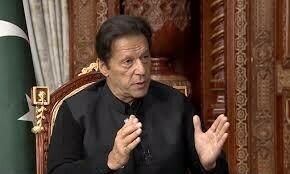ISLAMABAD: A judge dismissed the post-arrest bail application of former prime minister Imran Khan and his spouse, Bushra Bibi, in the new Toshakhana case on Monday.
The decision was announced by Special Judge Shahrukh Arjumand a day before the couple was set to be indicted in the case.
During the hearing, Mr Khan’s counsel Barrister Salman Safdar argued that his clients were already convicted in an identical case.
Therefore, he could not be tried twice in the same matter, Mr Safdar argued, while referring to Mr Khan and his wife’s conviction earlier this year for retaining a jewellery set received from a foreign dignitary.
Ex-PM’s counsel argues his client already convicted in an identical matter
The couple were sentenced to 14 years in jail in January, only days before the general elections.
The prosecution witnesses in the present case — related to a Bvlgari jewellery set — are the same who had testified against Mr Khan in the previous case, his counsel argued.
After the Supreme Court’s decision to uphold amendments in the National Accountability Ordinance, this case should be withdrawn by the prosecuting agency, i.e., the National Accountability Bureau (NAB), Mr Safdar said.
However, the case has instead been remanded to the Federal Investigation Agency.
The prosecution’s counsel argued that the jewellery set worth Rs71.5 million was retained by the ex-premier and his spouse for Rs2.9m only. He said that the FIA obtained the cost of the Bvlgari jewellery set from Saudi Arabia through the Foreign Office.
He claimed that the prosecution had strong evidence against
Mr Khan and his spouse and requested that the court dismiss the bail petition.
After the arguments, Judge Arjumand briefly reserved the order and later dismissed both bail petitions.
In its reference filed with the court, NAB has accused Mr Khan and his wife of retaining the jewellery set gifted to Ms Bibi by the Saudi royal family during their visit to the kingdom in May 2021.
It said that the jewellery set comprises a ring, bracelet, necklace and earrings.
The initial investigation found that the former first couple illegally retained this jewellery set, according to NAB.
On May 18, 2021, the then deputy military secretary to the PM, Col Rehan Mohammad, asked the Toshakhana section officer to evaluate the set’s price.
The section officer was also told that Mr Khan intends to retain the gift and declare it in his record.
In its reference, the anti-graft watchdog further alleged that during his term as prime minister, Mr Khan and his wife had received a total of 108 gifts from different heads of state and foreign dignitaries.
Of those gifts, they allegedly retained 58 gifts against an undervalued amount of over Rs142 million.“Out of these 108 gifts, the accused persons retained 58 gift boxes/sets against an undervalued amount of Rs142.1 million as assessed by appraisers,” the reference said.
Published in Dawn, October 1st, 2024














































